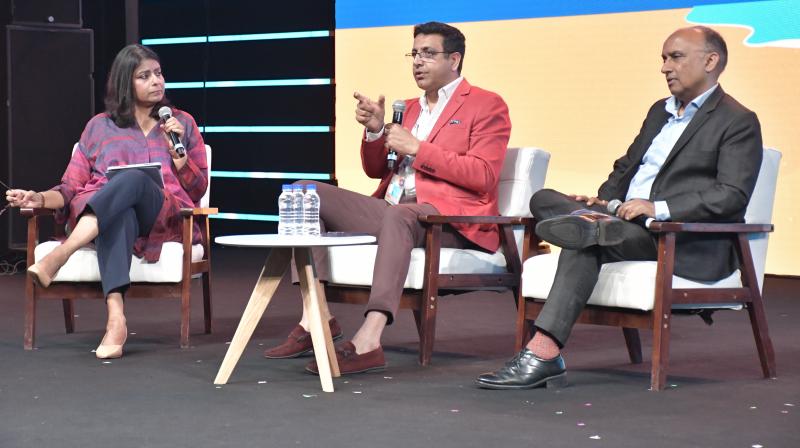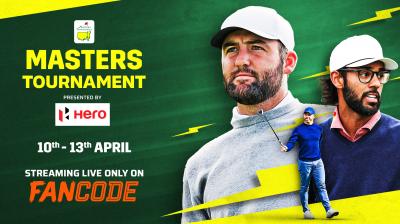Day three of Goafest 2024, saw an enlightening session around ‘evolving market landscape: navigating the new normal’, featuring Shashank Srivastava, member - executive committee, Maruti Suzuki, and Sunil Kataria, chief executive officer, Raymond Lifestyle (India and International).
The panel, moderated by Anuradha Sengupta, founder, @anuradhasays, delved into the complexities of the shifting market landscape, whilst navigating the uncharted waters of digitisation and unprecedented changes in its wake.
Srivastava highlights the importance of understanding consumer behaviour in the face of technological advancements and market fragmentation. “The changing technology in terms of media consumption and the product itself, coupled with the rate at which market fragmentation occurs are our two biggest challenges. Because without this understanding of consumers, it is difficult to plan any marketing activity,” he emphasised.
Stressing the need for dexterity in understanding consumer behaviour, he said, "We have to be on our toes to keep up with the constant changes in consumer behaviour."
He also highlighted the importance of collecting interactional data from all touchpoints and integrating it. “In our industry, we have identified 26 touch points from the time a consumer thinks of buying a car to the actual delivery. Maruti Suzuki has digitised 24 of these. The ones which are not digitised are the ‘test drive’ and the ‘delivery’, which has to happen in the 'real world'. So the process itself has changed and that's why the whole ecosystem of selling also has to change.”
Kataria spotlighted the importance of using first-party data and observations to gain insights into consumer behaviour.
“Today I think the whole shift is how are you listening to consumers because they are all over the place, using different kinds of platforms to interact. So, what we have shifted to is what we call ‘dynamic listening’ on a day-to-day basis," he said.
"Being in the fashion industry, trends shift so much. This is one industry where the product and fashion changes every three months. And no consumer will tell you what works and what doesn’t, so we have to listen and make our interpretations," he added.
Kataria also underscored the varied ways consumers engage with different platforms.
"Listening analytically to data is very important," he noted, adding that in-store observations are also extremely crucial. He stressed the value of using first-party data to gain insights quickly and effectively.
He further highlighted the critical role of comprehensive data analysis and ‘thin slicing of data’ in adapting to evolving consumer preferences.
“In our case, we have a lot of first-party data. That's one advantage that we get from listening analytically. The first-party data is a very good source of information which is garnered through in-store observations of consumer behaviour. That has a lot of power, and that’s something that’s very less understood by most retail companies,” he stated.
Adding to this, Srivastava affirmed that Maruti Suzuki is using this approach to launch new categories and products quickly through dynamic listening, data analysis, and quick decision-making.
The discussion also touched on the shifting expectations from agency partners.
Srivastava explained, "Ultimately, it is about understanding the customer. The expectation for the media agency, or the advertising agency, is to partner with us in understanding the consumer and being part of that strategy building. It’s not just transactional. That input has to come from everywhere, including from the consumers themselves.”
Regarding challenges faced by media agencies in a rapidly changing industry, Kataria emphasised the need for agility, keeping in mind the industry's dynamic nature and the need for agencies to adapt their strategies accordingly.
“Today 40% of ad spends is in digital. It's a completely different and unique ball game for which a constantly evolving skillset is required. It keeps changing so fast,” he noted.
“Now what we are seeing is the emergence of small specialist agencies/ startups who do that in a very agile manner. Agility is very, very important when it comes to technology,” Kataria stressed.
He further questioned the role of media agencies in delivering ideas and expectations, seeking to assess their delivery effectiveness. Discussing the role of large agencies, he highlighted the challenges of merging and acquiring different skills and the need for agencies to be more flexible and adaptable in their approach.
“We see them acquiring a lot of these digital shops. But does acquiring a digital agency take care of the cultural issues of agility which we can expect from a digital team,” he questioned, underlining the importance of being agile. “I don’t see agencies that much embedded in brands to understand that,” he added.
The panel also deliberated on the challenges presented by digital advertising measurement, while spotlighting the importance of standardising measurability in the digital sphere to conquer rampant ad frauds in digital advertising.












